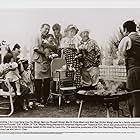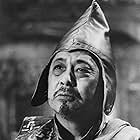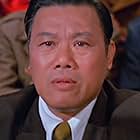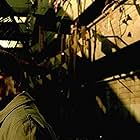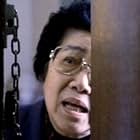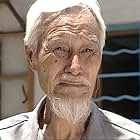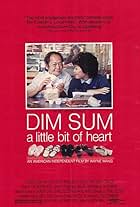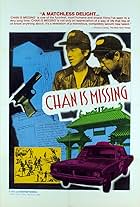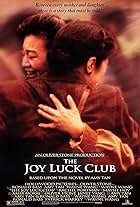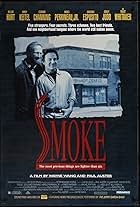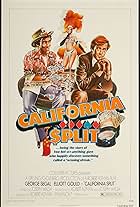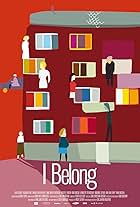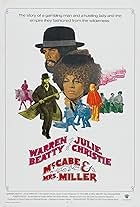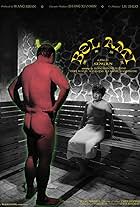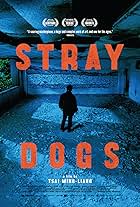A study in culture bridging, including ... a new US-born husband, trying to work within the traditional ways, a new China-born wife, eager to join the "dream" of America, two family-minded f... Read allA study in culture bridging, including ... a new US-born husband, trying to work within the traditional ways, a new China-born wife, eager to join the "dream" of America, two family-minded fathers, lots of gender-related social bifurcations.A study in culture bridging, including ... a new US-born husband, trying to work within the traditional ways, a new China-born wife, eager to join the "dream" of America, two family-minded fathers, lots of gender-related social bifurcations.
Sau-Kei Lee
- Bok Fat
- (as Lee Sau Kee)
Siu-Ming Lau
- Lee Gong
- (as Lau Siu Ming)
Fan Hui
- Ben Loy's Mom
- (as Hui Fun)
Helena Law
- Aunt Gim
- (as Law Lan)
Yuen-Yee Ng
- Third Sister
- (as Ng Yurn Yee)
Ta Lei
- Movie Translator
- (as Lui Tat)
Eric Tsang
- Ah Song
- (as Eric Tsang Chi Wai)
Wai Wong
- Chuck Ting
- (as Wong Wai)
Yu-Yung Teng
- Fat Man
- (as Tang Shun Nin)
Michael Ming-Yang Lee
- Old Lum
- (as Michael Lee)
Wing-Tat Woo
- Sum Woo
- (as Woo Wang Tat)
- Director
- Writers
- All cast & crew
- Production, box office & more at IMDbPro
Featured reviews
Ignore the picture that was used as the poster of this film, it is completely incongruous to the story. This is a film set in New York's Chinatown about a couple, one an Americanized Chinese young man (Ben Loy) who agrees to marry a young lady (Mei Oi) from a small village in China. She comes to New York and the story is the struggle of their compatibility. The movie is set in the late 1940's/early 1950's and it has a good rhythm to it. Most of it is in English, but that doesn't matter. At times you feel like a voyeur, looking in on this couple and wondering what will happen next to them. They do have their problems, and she even takes on a lover (Eric Tsang, who has a smallish but pivotal part), but the story is about the clash between Chinese traditions and their present day. While the film is good, it partly suffers from melodramatic overload. If you're interested in seeing a film about the immigrant experience, this is a good one about the Chinese one. I saw it on TCM in the wee hours of the morning. I watched it through, so that in and of itself is an endorsement.
Focusing on a little-known aspect of Chinese-American history – that Chinese men who had travelled to the States to make their fortune were prevented by federal law from marrying a native girl and from bringing their sweethearts over from China – director Wayne Wang crafts a pleasant story without really exploring the theme's full potential.
Asian heartthrob Russell Wong plays Ben Loy, a Chinese-American former serviceman in post-WW2 New York, who is allowed to marry a girl from the homeland following a relaxation of the laws due to the assistance given to America by China during the conflict. Fixed up by his wily old father (Victor Wong) with the daughter of a friend, Ben travels back to China and instantly (and fortuitously) falls in love with Mei Oi (Cora Miao, Wayne Wang's wife). Bringing her back to America, however, triggers a series of events that threatens both their marriage, and their entire family's standing in the Chinese-American community.
This is one of those films that, in the first act, looks as if it is going to turn out to be something special. But, sadly, things begin to unravel shortly after the young couple return to the States, and what could have been an insightful exploration into a culture and way of life that is alien to most of us becomes little more than a light rom-com. Ben, under pressure from both a new job that is more challenging than he expected and from a tight-knit community keen to welcome the arrival of the first child born to native parents, finds himself unable to perform in the bedroom. Mei Oi's eventual response to this is as unbelievable as it is cruel, and shoehorns a melodramatic plot that really has no place in a film that seemed to be setting itself up as a gently observed character piece. To add insult to injury, the manner in which it is resolved is equally unrealistic; so many questions are left unanswered, and the conclusion is so badly rushed that it devalues much of the good work that has gone before.
There is no doubt that Wang is an extremely talented director; he composes some wonderfully evocative frames and has a keen eye when it comes to the use of colour and shadow, but his control of narrative structure – in this film at least – is poor, leaving a talented cast to flounder in the second act, and seemingly lose interest midway through the third. Of course, Wang can only do what he can with the story handed to him, and writer Judith Rascoe must shoulder her share of the blame: by asking us to care for a couple about whom we are told so little – both as a couple and as individuals – and who seem to have little direction outside of complying with the wishes of their parent's, she leaves herself open to charges of naivety at best and, at worst, literary laziness.
Asian heartthrob Russell Wong plays Ben Loy, a Chinese-American former serviceman in post-WW2 New York, who is allowed to marry a girl from the homeland following a relaxation of the laws due to the assistance given to America by China during the conflict. Fixed up by his wily old father (Victor Wong) with the daughter of a friend, Ben travels back to China and instantly (and fortuitously) falls in love with Mei Oi (Cora Miao, Wayne Wang's wife). Bringing her back to America, however, triggers a series of events that threatens both their marriage, and their entire family's standing in the Chinese-American community.
This is one of those films that, in the first act, looks as if it is going to turn out to be something special. But, sadly, things begin to unravel shortly after the young couple return to the States, and what could have been an insightful exploration into a culture and way of life that is alien to most of us becomes little more than a light rom-com. Ben, under pressure from both a new job that is more challenging than he expected and from a tight-knit community keen to welcome the arrival of the first child born to native parents, finds himself unable to perform in the bedroom. Mei Oi's eventual response to this is as unbelievable as it is cruel, and shoehorns a melodramatic plot that really has no place in a film that seemed to be setting itself up as a gently observed character piece. To add insult to injury, the manner in which it is resolved is equally unrealistic; so many questions are left unanswered, and the conclusion is so badly rushed that it devalues much of the good work that has gone before.
There is no doubt that Wang is an extremely talented director; he composes some wonderfully evocative frames and has a keen eye when it comes to the use of colour and shadow, but his control of narrative structure – in this film at least – is poor, leaving a talented cast to flounder in the second act, and seemingly lose interest midway through the third. Of course, Wang can only do what he can with the story handed to him, and writer Judith Rascoe must shoulder her share of the blame: by asking us to care for a couple about whom we are told so little – both as a couple and as individuals – and who seem to have little direction outside of complying with the wishes of their parent's, she leaves herself open to charges of naivety at best and, at worst, literary laziness.
Older cultures coming to a new land. Chinese americans coming to america. At first, due to the immigration laws, it could only be the male workers. Then, when wives were allowed to come to the U. S., they brought their customs and points of view. Pride, respect, outlook on family. When Ben Loy (Russell Wong) gets married, but hasn't come up with offspring, his wife Mai Oi ( Cora Miao) thinks she has a solution... at least to some of her problems. Will this help, or will it only cause more problems? This is all about family pride, revenge, resolving issues within the community, and not involving outsiders. It's quite good. Directed by Wayne Wang, who also happens to be married to Maio, the female lead. Wang would also do the Joy Luck Club a couple years after this.
I remember seeing portions of this film shot at the now defunct and torn down San Francisco Studios. It was an interesting project that was one of many independent films being funded and shot at the time. My one anecdotal memory is seeing much of the crew and the studio employees being ushered out of the infamous Stage 2 (a warehouse like structure with little to no baffling, that served more as a storage area than an actual sound-stage) for the "love making" scenes. Seeing this film over a decade later I can't really understand what all the hub-bub was about ... unless the actors were nude underneath the sheets or something. In any event the bedroom scenes were shot sans an audience.
Oh well.
It's a nice little film that, for some reason, is labeled by Blockbuster Video as a "comedy." Certainly there're a couple of humorous moments, but once again the marketing types pull a bait-and-switch on this customer by labeling a light drama a comedy. This is NOT a comedy. However it does raise a smile here and there, and occasionally a chuckle, and, in spite of the intentional mis-labeling, it is a very good film.
The script moves along well enough. There's a fine story here, but the film's title, for myself, is a missed opportunity. And, unlike in other films, the cultural and generational gaps aren't played up to the hilt. That's a definite plus for this movie. Quality over quantity is given a premium in this movie. Yet at the same time the "message" and title of the film is almost too subtle to grasp, and is only made openly manifest in the final scenes. Even then you have to be somewhat on your toes to catch it.
It's a likable film. The lighting is nicely done, and was the foremost technical aspect that I noticed in this film. The cinematography is intimate and very straightforward. The acting is very fine; no over the top performances, nor understated moments; all characters are given appropriate exposure, and state their messages with emotional clarity.
The film is somewhat slow, but not overly, as is Wayne Wang's style. Overall a well stated film regarding Chinese-American society (specifically a newly wed couple, circa post WW2). It's by no means a gut-busting comedy, though there are comic moments in it. If you're expecting lots of laughs, then don't see this film. If you're expecting some mildly humorous situations told in a dramatic vein, then this film will probably entertain :)
Enjoy!
Oh well.
It's a nice little film that, for some reason, is labeled by Blockbuster Video as a "comedy." Certainly there're a couple of humorous moments, but once again the marketing types pull a bait-and-switch on this customer by labeling a light drama a comedy. This is NOT a comedy. However it does raise a smile here and there, and occasionally a chuckle, and, in spite of the intentional mis-labeling, it is a very good film.
The script moves along well enough. There's a fine story here, but the film's title, for myself, is a missed opportunity. And, unlike in other films, the cultural and generational gaps aren't played up to the hilt. That's a definite plus for this movie. Quality over quantity is given a premium in this movie. Yet at the same time the "message" and title of the film is almost too subtle to grasp, and is only made openly manifest in the final scenes. Even then you have to be somewhat on your toes to catch it.
It's a likable film. The lighting is nicely done, and was the foremost technical aspect that I noticed in this film. The cinematography is intimate and very straightforward. The acting is very fine; no over the top performances, nor understated moments; all characters are given appropriate exposure, and state their messages with emotional clarity.
The film is somewhat slow, but not overly, as is Wayne Wang's style. Overall a well stated film regarding Chinese-American society (specifically a newly wed couple, circa post WW2). It's by no means a gut-busting comedy, though there are comic moments in it. If you're expecting lots of laughs, then don't see this film. If you're expecting some mildly humorous situations told in a dramatic vein, then this film will probably entertain :)
Enjoy!
A rarity in that we have an American made Chinese film that isn't based on Triad violence.
A breath of fresh air it is.
Young man and woman romance each other in America. Said couple is Chinese. They wish to stick to the traditions but adapt to their new homeland.
A romantic film that you can bring the wife or girlfriend to. And anyone into China or Asia will like it too. The culture gets a good going over here. In a positive way mind you.
And there is a lot of truth to it all too. Yes, elder Chinese men came to the U.S. alone and sometimes never saw their wives for 20-30 years. These marriages lasted. Impressive.
Romance with steamed dumplings here. Nicely done Wayne.
A breath of fresh air it is.
Young man and woman romance each other in America. Said couple is Chinese. They wish to stick to the traditions but adapt to their new homeland.
A romantic film that you can bring the wife or girlfriend to. And anyone into China or Asia will like it too. The culture gets a good going over here. In a positive way mind you.
And there is a lot of truth to it all too. Yes, elder Chinese men came to the U.S. alone and sometimes never saw their wives for 20-30 years. These marriages lasted. Impressive.
Romance with steamed dumplings here. Nicely done Wayne.
Did you know
- TriviaThe movie's ''Eat a Bowl of Tea'' title is a literal English translation to a Cantonese Chinese phrase that means "take your medicine" or "swallow your medicine".
- ConnectionsFeatured in The Slanted Screen (2006)
- How long is Eat a Bowl of Tea?Powered by Alexa
Details
- Release date
- Country of origin
- Languages
- Also known as
- Eine Tasse Tee für die Liebe
- Filming locations
- Production company
- See more company credits at IMDbPro
Box office
- Gross US & Canada
- $231,423
Contribute to this page
Suggest an edit or add missing content












